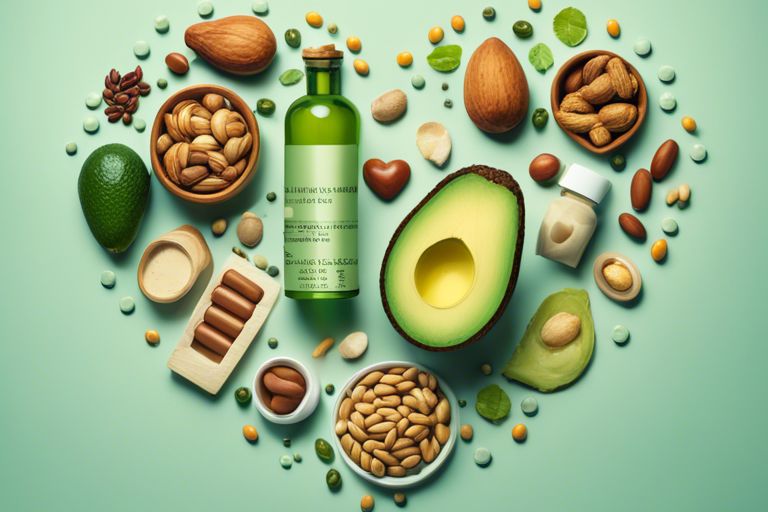Are you struggling to manage your cholesterol levels through diet and exercise alone? You may be considering nutritional supplements as a potential solution. In this blog post, we will explore the role of nutritional supplements in managing cholesterol levels, including their potential benefits and risks. It’s crucial to understand the potential impact of nutritional supplements on your cholesterol levels before incorporating them into your health routine.
Understanding Cholesterol
For many people, cholesterol is a confusing topic. You hear about the dangers of high cholesterol and the importance of keeping it in check, but what does it really mean? Cholesterol is a waxy, fat-like substance found in all cells of your body. It’s crucial for the formation of cell membranes, certain hormones, and vitamin D. However, too much cholesterol can lead to health problems such as heart disease. There are two main types of cholesterol: low-density lipoprotein (LDL) and high-density lipoprotein (HDL). Understanding the difference between these two types of cholesterol is essential for managing your cholesterol levels.
Types of Cholesterol
There are two main types of cholesterol that you need to be familiar with: LDL cholesterol and HDL cholesterol. Here’s a breakdown of each:
- LDL cholesterol: Also known as “bad” cholesterol, LDL cholesterol can build up on the walls of your arteries, leading to atherosclerosis and an increased risk of heart disease.
- HDL cholesterol: Known as “good” cholesterol, HDL cholesterol helps remove LDL cholesterol from the arteries, reducing the risk of heart disease.
Recognizing the difference between these two types of cholesterol is crucial for understanding your cholesterol levels and managing your overall health.
Factors Affecting Cholesterol Levels
There are several factors that can affect your cholesterol levels, including diet, exercise, weight, and age. Any imbalance in these factors can lead to an increase in LDL cholesterol and a decrease in HDL cholesterol, putting you at a higher risk of heart disease. It’s important to be aware of these factors and take steps to manage them to keep your cholesterol levels in check.
Nutritional Supplements for Cholesterol
Assuming you’re looking to lower your cholesterol levels, you may have come across information about the potential benefits of nutritional supplements. While a healthy diet and exercise should be a cornerstone of your cholesterol management plan, certain supplements may offer additional support. However, it’s important to approach supplementation with caution and consult with your healthcare provider before adding any new products to your regimen. Can Vitamins Help Lower High Cholesterol?
Fiber Supplements
Adding fiber to your diet can help lower cholesterol levels by reducing the absorption of cholesterol in your bloodstream. Some research suggests that soluble fiber, in particular, may be beneficial for cholesterol management. Supplements such as psyllium husk or glucomannan may be beneficial for you. These products are designed to help lower LDL cholesterol levels and promote heart health. However, it’s important to start with small doses and gradually increase your intake to avoid digestive discomfort. Fiber supplements can be highly effective in lowering cholesterol when used in conjunction with a healthy diet and lifestyle.
Omega-3 Fatty Acids
You may have heard about the heart-healthy benefits of omega-3 fatty acids. These essential fatty acids are found in fatty fish such as salmon, mackerel, and sardines, as well as in fish oil supplements. Omega-3 fatty acids have been shown to reduce triglycerides, improve HDL cholesterol levels, and lower the risk of heart disease. If you’re not a fan of fish or don’t consume it regularly, adding an omega-3 supplement to your routine may be beneficial for you. However, it’s important to choose a high-quality supplement and pay attention to the dosage, as excessive intake can have adverse effects. Omega-3 fatty acids can play a significant role in improving your cholesterol profile and reducing the risk of cardiovascular problems.
Efficacy and Research
After reading through various research studies, you may wonder if nutritional supplements can truly help you lower your cholesterol levels. Studies have shown that certain supplements, such as red yeast rice, plant sterols, and fish oil, can have a positive impact on your cholesterol levels. According to Healthline, 9 Natural Cholesterol Reducers include supplements that have been found to be effective in lowering LDL cholesterol and triglyceride levels.
Clinical Studies on Supplements and Cholesterol
Clinical studies have been conducted to evaluate the effects of nutritional supplements on cholesterol levels. For example, a study published in the Journal of the American Medical Association found that red yeast rice supplementation significantly reduced LDL cholesterol levels. Similarly, research has shown that plant sterols, commonly found in supplements, can help lower cholesterol levels, particularly LDL cholesterol. Additionally, fish oil supplements have been found to have a positive impact on triglyceride levels. These findings suggest that certain nutritional supplements can indeed be effective in managing your cholesterol levels.
Limitations and Considerations
It is important to note that while nutritional supplements can offer benefits in managing cholesterol levels, they are not a cure-all solution. Supplements should not be used as a replacement for prescribed medication. Furthermore, the quality and purity of supplements can vary, so it is crucial to choose reputable brands with a track record of efficacy and safety. Additionally, it is essential to consult with your healthcare provider before starting any new supplements, especially if you are already taking cholesterol-lowering medication or have other health conditions. Remember, supplements are meant to complement a healthy lifestyle and should be used in conjunction with a balanced diet and regular exercise.
Lifestyle Modifications
However, before considering nutritional supplements, it’s important to address lifestyle modifications that can have a significant impact on your cholesterol levels. According to an article from AARP, certain supplements may not be as effective as you think in lowering cholesterol levels. You can read more about this in the article 6 Supplements That Won’t Lower Your Cholesterol.
Diet and Exercise
One of the most effective ways to improve your cholesterol levels is through your diet and exercise habits. By implementing a heart-healthy diet that includes a variety of fruits, vegetables, whole grains, and lean proteins, you can help reduce your LDL (low-density lipoprotein) cholesterol levels. Additionally, regular physical activity can help raise your HDL (high-density lipoprotein) cholesterol levels, which is beneficial for your overall cardiovascular health.
Combining Supplements with Lifestyle Changes
While certain supplements may offer some benefits for your cholesterol levels, it’s important to remember that they should be used in conjunction with lifestyle changes. Adding supplements to a healthy diet and exercise routine can potentially provide added support in managing your cholesterol levels. However, it’s crucial to consult with a healthcare professional before incorporating any supplements into your daily regimen to ensure they are safe and effective for you. It’s important to approach the management of your cholesterol levels holistically, considering both dietary and lifestyle changes alongside any potential supplement use.

Conclusion: Can Nutritional Supplements Help with Cholesterol Levels?
From above, it is clear that nutritional supplements can play a beneficial role in managing cholesterol levels. However, it is important to remember that they are not a substitute for a healthy diet and regular exercise. Before adding any new supplements to your regimen, it is crucial to consult with a healthcare professional to ensure they are safe and appropriate for your individual health needs. With the right approach and guidance, nutritional supplements can be a valuable tool in maintaining healthy cholesterol levels.


